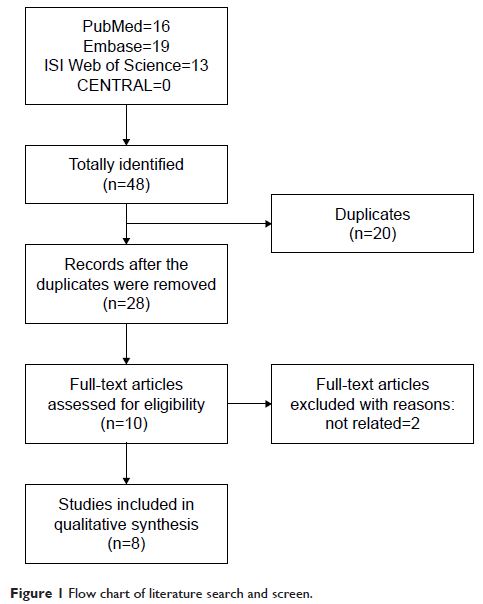9 0 6 7 6
论文已发表
注册即可获取德孚的最新动态
IF 收录期刊
- 2.6 Breast Cancer (Dove Med Press)
- 3.9 Clin Epidemiol
- 3.3 Cancer Manag Res
- 3.9 Infect Drug Resist
- 3.6 Clin Interv Aging
- 4.8 Drug Des Dev Ther
- 2.8 Int J Chronic Obstr
- 8.0 Int J Nanomed
- 2.3 Int J Women's Health
- 3.2 Neuropsych Dis Treat
- 4.0 OncoTargets Ther
- 2.2 Patient Prefer Adher
- 2.8 Ther Clin Risk Manag
- 2.7 J Pain Res
- 3.3 Diabet Metab Synd Ob
- 4.3 Psychol Res Behav Ma
- 3.4 Nat Sci Sleep
- 1.9 Pharmgenomics Pers Med
- 3.5 Risk Manag Healthc Policy
- 4.5 J Inflamm Res
- 2.3 Int J Gen Med
- 4.1 J Hepatocell Carcinoma
- 3.2 J Asthma Allergy
- 2.3 Clin Cosmet Investig Dermatol
- 3.3 J Multidiscip Healthc

已发表论文
SMAD3 基因中 rs12901499 多态性与骨关节炎风险的关系:一项综合分析
Authors Gao ST, Lv ZT, Sheng WB
Received 2 February 2018
Accepted for publication 14 March 2018
Published 15 May 2018 Volume 2018:14 Pages 929—936
DOI https://doi.org/10.2147/TCRM.S164409
Checked for plagiarism Yes
Review by Single-blind
Peer reviewers approved by Dr Justinn Cochran
Peer reviewer comments 3
Editor who approved publication: Professor Deyun Wang
Purpose: This study was
conducted to assess and synthesize the current evidence on the association
between rs12901499 polymorphism in SMAD3 gene and risk of osteoarthritis (OA).
Materials and methods: Four electronic databases, including PubMed, Embase, ISI Web of Science, and CENTRAL were systematically searched for potential studies. Summary odds ratio and corresponding 95% CI were calculated to evaluate the association. Risk of bias was assessed through the Newcastle–Ottawa Scale. Subgroups and sensitivity analyses were performed using the RevMan 5.3 software. Publication bias was evaluated by Egger’s and Begg’s tests. Power analysis was conducted using the Power and Sample Size Calculation program.
Results: Eight case–control studies containing 5,625 patients with OA and 5,600 healthy controls were obtained for the meta-analysis. After excluding cohorts with inadequate power, the pooled data supported that G allele carriers of rs12901499 had a significantly increased risk of OA (odds ratio 1.31, 95% CI: 1.21 to 1.43, P <0.00001). When stratified by OA site and ethnicity, the association remained statistically significant.
Conclusion: The combined results evidently supported that rs12901499 polymorphism in SMAD3 gene is significantly associated with OA vulnerability across both Caucasian and Asian populations.
Keywords: osteoarthritis, polymorphism, SMAD3, rs12901499, meta-analysis
Materials and methods: Four electronic databases, including PubMed, Embase, ISI Web of Science, and CENTRAL were systematically searched for potential studies. Summary odds ratio and corresponding 95% CI were calculated to evaluate the association. Risk of bias was assessed through the Newcastle–Ottawa Scale. Subgroups and sensitivity analyses were performed using the RevMan 5.3 software. Publication bias was evaluated by Egger’s and Begg’s tests. Power analysis was conducted using the Power and Sample Size Calculation program.
Results: Eight case–control studies containing 5,625 patients with OA and 5,600 healthy controls were obtained for the meta-analysis. After excluding cohorts with inadequate power, the pooled data supported that G allele carriers of rs12901499 had a significantly increased risk of OA (odds ratio 1.31, 95% CI: 1.21 to 1.43, P <0.00001). When stratified by OA site and ethnicity, the association remained statistically significant.
Conclusion: The combined results evidently supported that rs12901499 polymorphism in SMAD3 gene is significantly associated with OA vulnerability across both Caucasian and Asian populations.
Keywords: osteoarthritis, polymorphism, SMAD3, rs12901499, meta-analysis
